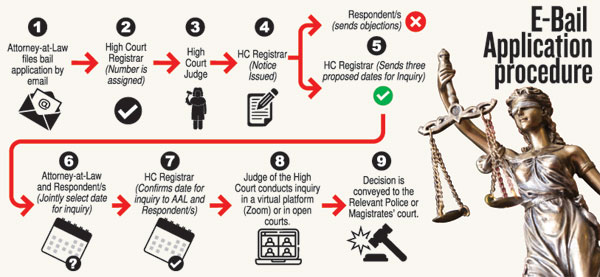News
e-filing of bail applications now a reality; virtual hearings expected to pick up
View(s):
Chief Justice Jayantha Jayasuriya (extreme right) , Supreme Court Justice Buwaneka Aluwihare, High Court Judge Adithya Patabendi and High Court Judge Manjula Tilakaratna at the launch of the programme of E-filing of bail applications and digital virtual hearings at the High Courts.
Aimed at expediting cases clogged up due to COVID-19 and the closure of several courts around the country, electronic filing or e-filing of bail applications got off the ground this week.
The first case taken up was of a woman suspect in a drug possession case. (please see box story).
The COVID-19 outbreak early this year expedited the introduction of the system on an initiative of the Legal Aid Commission of Sri Lanka Chairman, Rohan Sahabandu PC, in consultation with Chief Justice Jayantha Jayasuriya, with the initiative being backed by the United Nations Development Programme (UNDP).

Resident Representative, UNDP Robert Juhkam in conversation with Chief Justice Jayantha Jayasuriya after the launch of the programme
Supreme Court Justice Buwaneka Aluwihare spearheaded a team comprising several High Court Judges, Judicial Services Commission (JSC) and UNDP officials to make the scheme operational. They gathered at the Colombo High Court 1 for the launch this week. Virtual hearings of bail applications are expected to pick up from early next year.
Chief Justice Jayasuriya said the COVID-19 outbreak early this year posed a tremendous challenge to the judiciary with some of the problems being the overcrowding of the prisons and the extension of remand orders without getting the prisoners physically present in courts.
“It was interesting to see how we have developed a system between March and now. As a result, we could meet the challenges effectively after the second wave of COVID-19,” he said.
Justice Aluwihare said the scheme was the first paperless judicial process in the country, a process that could be initiated and proceedings could be brought to a terminal point without a scrap of paper, save for issuing the bail order.
Describing the initiative as a new phase in the administration of justice in Sri Lanka, he said that since November 14, the High Court had processed 250 bail applications and, within a short period, more than 70 bail applications had been filed through the e-filing system.

Invitees at the launch. Pix by Indika Handuwala
UNDP Resident Representative Robert Juhkam said the UNDP was supporting several countries to introduce remote court proceedings through technical assistance for law reforms in areas such as privacy, data protection and training for professionals on the use of digital platforms, in addition to providing digital equipment.
“UNDP Sri Lanka is pleased to have supported the first phase of remote court hearings that began in 23 courts during the lockdown in May 2020. We have now expanded the initiative to the Supreme Court and High Courts across the island. We are pleased to note that about 10,000 bail hearings and more than 75 remote legal counselling sessions have been facilitated thus far through our support,” Mr. Juhkam said.
| The procedure for e-filing of bail requests According to the procedure outlined for e-filing of bail applications and digital virtual hearings in High Courts, an attorney at law should file the bail application in PDF format and send it to the Registrar of the High Court with scanned copies of relevant documents. The full name and address of the attorney with the enrolment number assigned by the Supreme Court should be stated or a scanned copy of the identity card issued by Bar Association of Sri Lanka should be attached. Upon receipt of the application, the High Court Registry assigns a reference number and informs the attorney. The Attorney General and any other respondents are, thereafter, informed and the respondents can file objections via email. Three dates are nominated for the inquiry, in keeping with the court’s schedule. The petitioner and the respondent/s are jointly expected to select a date for the hearing. The date is fixed thereafter. If the parties wish, the inquiry will be conducted via a virtual platform agreeable to the parties. The inquiry is, thereafter, held in a virtual platform — Zoom, for instance — by the High Court judge. The relevant parties, including the police or the relevant Magistrate court, is informed thereafter. | |
 |

